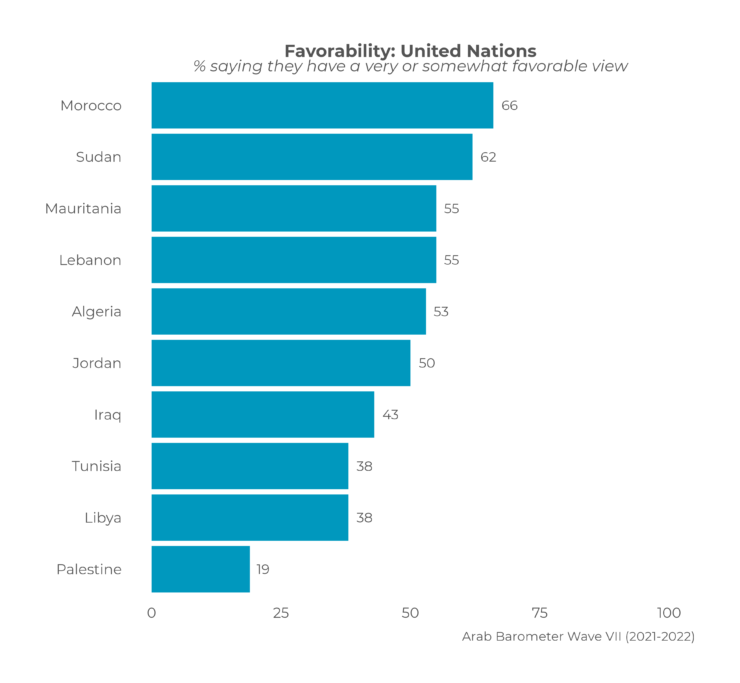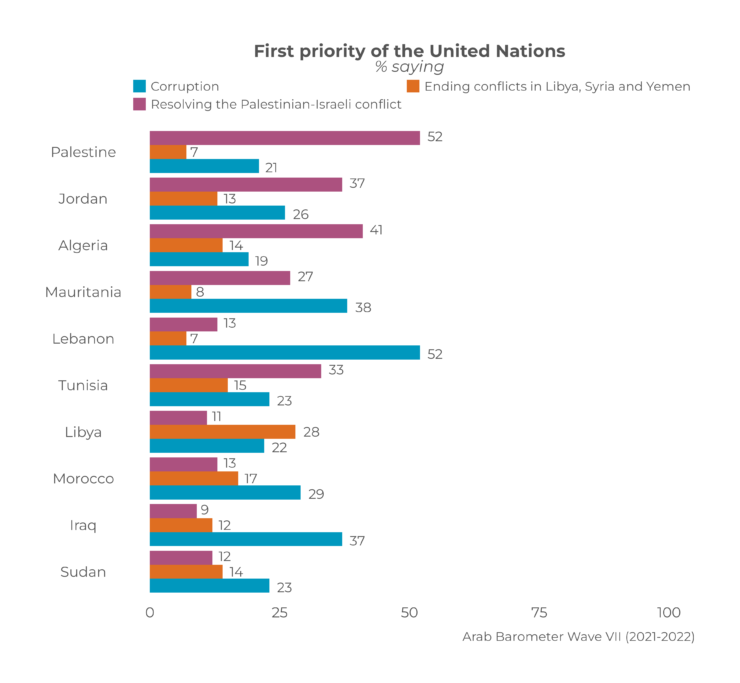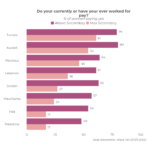The United Nations (UN) plays a critical role in addressing international conflicts, particularly in the Arab world. Yet, perceptions of the organization differ widely across the region, influenced by each country’s unique experiences and priorities. Using the findings from the Arab Barometer Wave VII (2021-2022) survey, this blog explores which Arab publics hold favorable views of the UN, what they believe the UN priorities should be, and how context influences these preferences.
Who Favors the UN?
As shown in the graph below, favorability toward the UN varies significantly across the Arab world. Countries that have experienced wars where the UN failed to intervene effectively—such as Palestine, Iraq, and Libya—report lower levels of favorability. In these countries, the UN is often viewed as ineffective, leading many citizens to label their perception of the organization as “very unfavorable.”
In contrast, countries like Jordan, Algeria, Morocco, Lebanon, Sudan, and Mauritania report higher levels of favorability toward the UN. These nations have not faced direct international conflicts involving Western powers, which may explain why their populations still view the UN as a vital institution for mediating disputes and providing a path to conflict resolution. They have not experienced the same level of direct disappointment from the organization’s inactions.
Interestingly, Tunisia presents an exception. Despite not experiencing interstate wars, public favorability for the UN is relatively balanced. While 31 percent of Tunisian citizens view the UN as “very unfavorable,” another 31 percent rate it as “somewhat favorable.”

What Do Arabs Want the UN to Do?
When asked what the UN’s main priority in the region should be, Arab populations highlighted two dominant priorities: resolving the Israeli-Palestinian conflict and addressing corruption.
People in countries such as Palestine, Algeria, Jordan, and Tunisia overwhelmingly prioritize resolving the Israeli-Palestinian conflict. In Palestine, 52 percent of citizens believe this should be the UN’s primary focus, followed by 41 percent in Algeria, 37 percent in Jordan, and 33 percent in Tunisia.
In contrast, in countries like Lebanon, Mauritania, Iraq, Morocco, and Sudan, corruption is viewed as the most pressing concern. In Lebanon, 52 percent of citizens identify corruption as the key issue the UN should address—the highest among the countries shown—followed by 38 percent in Mauritania, 37 percent in Iraq, 29 percent in Morocco, and 24 percent in Sudan.
Corruption is a significant issue in the region. Even in countries that prioritize the Israeli-Palestinian conflict, corruption emerges as the second-highest concern, as shown below for Jordan, Algeria, Tunisia, and Palestine.
In Libya, the priority shifts. Citizens prioritize addressing conflicts such as those in Libya, Syria, and Yemen before focusing on corruption. This is logical, as countries with ongoing conflicts naturally prioritize resolving those issues first.

Can the UN Meet Expectations?
Despite low favorability in countries like Palestine, Iraq, and Libya, many citizens from these nations still hope that the UN will prioritize and address critical issues, such as the Palestinian conflict or internal conflicts in Libya. This raises important questions: Can the UN restore favorability in these countries by making meaningful changes? What steps can it take to align its priorities with the region’s dual demands for conflict resolution and combating corruption? Moreover, can the UN sustain its favorability in countries that have not yet experienced significant disappointment in its actions?
The answers to these questions will shape the UN’s ability to regain trust in the Arab world and uphold its role as a credible and effective international institution for those who continue to favor it.
Dana Abu-Haltam is a Political Science PhD Candidate at the University of Tennessee, Knoxville. The views expressed in this piece are her own.


